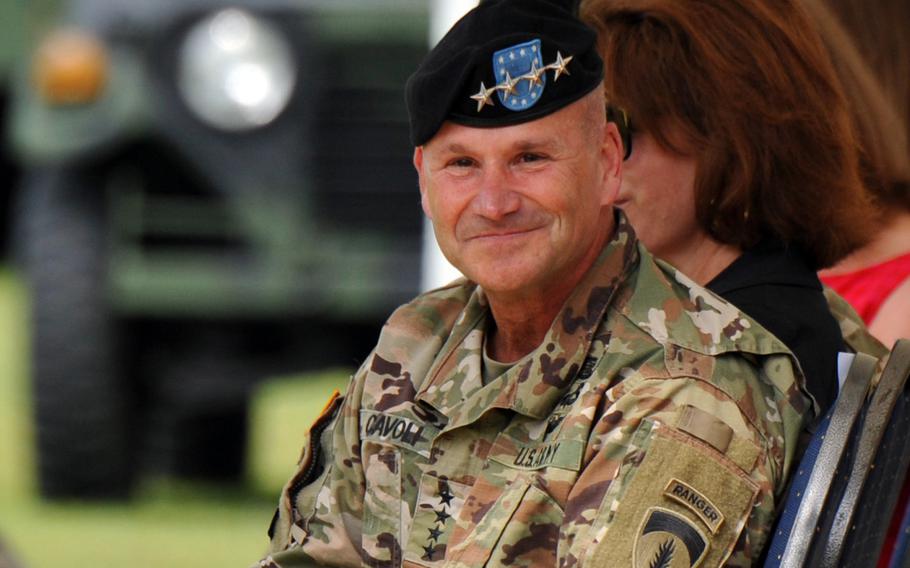
Gen. Christopher Cavoli, U.S. Army Europe and Africa commander, listens to speeches during a 21st Theater Sustainment Command ceremony in Kaiserslautern, Germany, in June 2021. Cavoli is poised to succeed Air Force Gen. Tod Wolters as the leader of U.S. European Command and Supreme Allied Commander Europe, pending confirmation by the Senate. (Michael Abams/Stars and Stripes)
WASHINGTON — The nominee to be the next commander of U.S. and NATO forces in Europe told senators on Thursday that expanding the alliance would change the security landscape in the region to Russia’s detriment.
Gen. Christopher Cavoli, the U.S. Army’s top general in Europe, said adding Finland and Sweden to NATO would give the military alliance a footprint over almost the entire Baltic Sea coastline and force Russia to reconfigure longstanding troop formations for a buffer against Finland.
Cavoli is poised to succeed Air Force Gen. Tod Wolters as the leader of U.S. European Command and Supreme Allied Commander Europe, pending confirmation by the Senate. Cavoli said Thursday during a Senate Armed Services Committee hearing that he would lead U.S. forces as an example for other NATO members.
“The U.S.’s special role inside NATO is to point the way toward the future and demonstrate with our actions how to go in that direction,” he said. “As we arm our own military, we create a model that other nations in the alliance can emulate.”
The U.S. is by far the largest defense spender in the alliance, accounting for 51% of NATO’s combined Gross Domestic Product and 69% of combined defense expenditure, according to a March report by NATO Secretary General Jens Stoltenberg.
Cavoli said he wanted to see each member country exceed NATO’s 2% of GDP military spending target. Just eight NATO nations in the 30-member alliance met that threshold in 2021, according to Stoltenberg.
“Two percent is a floor, not a ceiling,” the general said.
Finland’s defense budget is near that figure, and Sweden is aiming to meet it by 2028. The two countries filed their applications for NATO membership earlier this month as Russia wages war in Ukraine to deter the alliance’s expansion.
Cavoli said Finland’s military investments, including a pending purchase of 64 F-35 fighter jets, as well as history with Russia will be a major asset on NATO’s eastern flank. Finland shares an 810-mile border with Russia and has cultivated a large, well-equipped and well-trained army that fended off a Soviet invasion during the 1939-40 Winter War.
“The Finns are absolutely expert in defending that border,” Cavoli said. “I’ve personally gone on a snowmobile with the chief of the border guard and the chief of the Finnish army down half the length of that border and I was very impressed with their ability to defend it.”
Cavoli told Sen. Tom Cotton, R-Ark., that he disagreed with fears that bringing NATO to Russia’s doorstep could expose the alliance to greater risk. He said the risk will be felt on Russia’s side.
For years, Moscow’s amicable relationship with Helsinki allowed it to maintain light ground forces near the Russia-Finland border and concentrate most troops elsewhere, Cavoli said.
“That possibility will now go away for Russia,” he said.
Still, Cavoli cautioned the U.S. and its NATO allies should emphasize transparency when conducting large-scale exercises to avoid miscommunication with Russia. Cavoli noted NATO’s supreme allied commander has a direct line of communication with a Russian counterpart.
“It’s a delicate balance because one must not shy away from activity to stay strong … but it’s also necessary not to overdo that and create a problem where there wasn’t a problem,” he said.
The Russian Defense Ministry responded angrily to Finland’s move to join NATO, with Russian Defense Minister Sergei Shoigu announcing last week that Russia will form 12 units and divisions in its western military district by the end of the year. Russian officials have also suggested stationing nuclear-armed missiles on the Baltic Sea as a retaliatory measure.
Sweden’s accession into NATO would bring the Baltic Sea under near total NATO jurisdiction, a development that Cavoli said would be of “enormous military significance.” The alliance also would gain access to the strategically located Swedish island of Gotland, which lies about 200 miles from the Russian enclave of Kaliningrad, the headquarters of Russia’s Baltic Fleet.
“I think [Sweden] will bring an enormous amount of surface capability to us in the Baltic Sea,” Cavoli said. “They also have underwater capabilities that will help us as well.”
Cavoli declined to speculate on how the widening of the alliance and Russia’s war in Ukraine will affect long-term American troop presence in Europe, but he said he does not expect a need for large additional forces. The U.S. surged troops into Europe following Russia’s invasion of Ukraine in February.
“Clearly what’s been happening is the center of gravity of the NATO force has been shifting eastward,” Cavoli said. “Depending on the outcome of conflict, we may have to continue that for some time.”
Senators on Thursday were particularly taken with Cavoli’s extensive knowledge of Russia, believing it will be critical for managing deteriorating relations with the Kremlin.
Cavoli is a Russian speaker who has lived in Moscow for months at a time and traveled “all over the former Soviet space.” He previously served as director for Russia on the Joint Staff and holds a master’s degree in Russian and East European Studies from Yale University.
“I’d say you are Vladimir Putin’s worst nightmare,” said Sen. Dan Sullivan, R-Alaska.
If approved, Cavoli is expected to assume command of his new post during the summer and serve for three years.